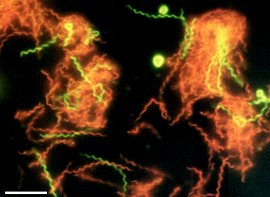Spirochaeta americana: Difference between revisions
| Line 6: | Line 6: | ||
==Description and Significance== | ==Description and Significance== | ||
''S. americana'' is an extremophile. It has been found in the highly alkaline anaerobic environment of Mono Lake, California. ''S. Americana'' can also inhabit areas with high sulfur and salt concentrations. ''S. americana'' has scientists especially excited. Some believe that the harsh environment of Mono Lake is similar to that of Mars, giving hope to the theory that life existed there. [1, 2] | ''S. americana'' is an extremophile. It has been found in the highly alkaline anaerobic environment of Mono Lake, California. ''S. Americana'' can also inhabit areas with high sulfur and salt concentrations. ''S. americana'' has scientists especially excited. Some believe that the harsh environment of Mono Lake is similar to that of Mars, giving hope to the theory that life existed there. [1, 2] | ||
''S. americana'' is an obligate anaerobe and has an optimal pH range of 8.0 - 10.5. [2] | ''S. americana'' is an obligate anaerobe and has an optimal pH range of 8.0 - 10.5. [2]Cells of the Gram-negative strain were motile and spirochaete-shaped with sizes of 0.2-0.22 x 8-18 microm.[3] | ||
Revision as of 05:30, 21 March 2008
Classification
Higher order taxa:
Domain Bacteria; Phylum Spirochetes; Class Spirochetes; Order Spirochaetales; Family Spirochaeta; Genus Spirochaeta; Species Spirochaeta americana
Description and Significance
S. americana is an extremophile. It has been found in the highly alkaline anaerobic environment of Mono Lake, California. S. Americana can also inhabit areas with high sulfur and salt concentrations. S. americana has scientists especially excited. Some believe that the harsh environment of Mono Lake is similar to that of Mars, giving hope to the theory that life existed there. [1, 2] S. americana is an obligate anaerobe and has an optimal pH range of 8.0 - 10.5. [2]Cells of the Gram-negative strain were motile and spirochaete-shaped with sizes of 0.2-0.22 x 8-18 microm.[3]
[1]
Genome Structure
Cell Structure and Metabolism
Ecology
Isolation and Cultivation
References
1. http://science.nasa.gov/headlines/y2003/30jul_monolake.htm
2. http://www.scienceagogo.com/news/20030630213230data_trunc_sys.shtml

